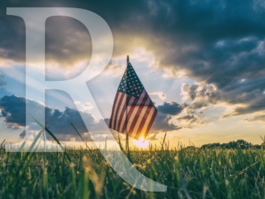In Search of Self-Governance
A New Book By Scott Rasmussen
In Search of Self Governance, a new book by Scott Rasmussen, takes a look at our nation’s broken political system in a brand new Rasmussen Reports publication (Order your copy now).
“Pollster Scott Rasmussen has his finger on the pulse of America, conducting hundreds of spot-on surveys every year,” says Dr. Larry J. Sabato Director of the University of Virginia’s Center for Politics. “Now he takes what he has learned about us one step further, with thought-provoking advocacy about the way we the people should govern ourselves.”
Years of public opinion polls have shown a growing disconnect between the American people and the nation’s political leaders. Rasmussen’s conclusion: Americans don’t want to be governed from the left, the right or the center. They want to govern themselves. The American desire for – and attachment to – self-governance runs deep. It is one of our nation’s cherished core values and an important part of our cultural DNA. And right now, it needs to be saved.
“Self-governance is about far more than politics and government,” says Rasmussen. “It requires a lot of the American people, and it has nothing to do with the petty partisan games played by Republicans and Democrats. Unfortunately, even after more than 200 years of success, there is an urgent need to defend this most basic of American values.”
Rasmussen dissects the issues brought about by an “unholy alliance” between government and big business. He details the concept of self-governance, how we live it every day through the choices we make at home and in our communities, and how we exhibit it through volunteerism and other things outside the world of politics.
This week, In Search of Self-Governance is available exclusively on the Rasmussen Reports web site. Order your copy now).
Here’s a sneak-peek at the book’s introduction:
As a public opinion pollster, I am often called upon to point out the differences between Americans—who supports this candidate or opposes that legislation. Which demographic group says yes, which says no?
And, of course, there are real differences to talk about. From a partisan perspective, Republican voters see things differently from Democrats. There are also differences between men and women, rich and poor, young and old, whites and non-whites, investors and non-investors, liberals and conservatives, government employees and entrepreneurs.
The more you divide America into subgroups, the more we seem divided.
Despite these differences, I am far more interested in what unites us. And, the good news is that there is lots of common ground that unites the American people today.
Like most Americans, I consider myself very fortunate to live in the United States. I’m proud to be an American and proud of our great national heritage—a heritage built upon freedom, liberty, and the belief that the people should rule their rulers. I am grateful for those who have given their lives defending our freedoms and thankful for those who defend us still today. While our nation is not perfect, the United States is more than a great place to live; it’s a bright beacon of liberty and hope for the entire world.
Sadly, another piece of common ground today is frustration with political dialogue that seems designed to polarize and divide the public. Most of us have come to believe that the political system is broken, that most politicians are corrupt, and that neither major political party has the answers. Some of us are ready to give up and some of us are ready to scream a little louder. But all of us believe we can do better.
Dealing with a broken political system is especially frustrating because our nation has such a rich heritage of self-governance. The American people may disagree vehemently about specific policy is­sues, but we share a common belief that things work best when the people are in charge.
And that’s why I wrote this essay. Self-governance is about far more than politics and government. It requires a lot of the American people and it has nothing to do with the petty partisan games played by Republicans and Democrats. Unfortunately, even after more than 200 years of success, there is now an urgent need to defend this most basic of American values.
This essay is not filled with polling data, but the ideas and attitudes presented are shared by a solid majority of Americans. In many ways, it is a celebration of consensus. Not everybody will agree with every single detail, but the overwhelming majority shares a deep commitment to self-governance.
That’s what makes our nation special.
Scott Rasmussen
January 2010
Rasmussen Reports is a media company specializing in the collection, publication and distribution of public opinion information.
We conduct public opinion polls on a variety of topics to inform our audience on events in the news and other topics of interest. To ensure editorial control and independence, we pay for the polls ourselves and generate revenue through the sale of subscriptions, sponsorships, and advertising. Nightly polling on politics, business and lifestyle topics provides the content to update the Rasmussen Reports web site many times each day. If it's in the news, it's in our polls. Additionally, the data drives a daily update newsletter and various media outlets across the country.
Some information, including the Rasmussen Reports daily Presidential Tracking Poll and commentaries are available for free to the general public. Subscriptions are available for $4.95 a month or 34.95 a year that provide subscribers with exclusive access to more than 20 stories per week on upcoming elections, consumer confidence, and issues that affect us all. For those who are really into the numbers, Platinum Members can review demographic crosstabs and a full history of our data.
To learn more about our methodology, click here.



